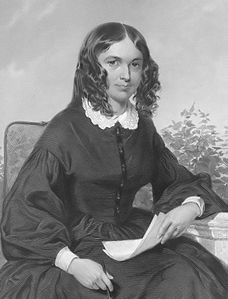Analysis of Minstrelsy
Elizabeth Barrett Browning 1806 (Kelloe) – 1861 (Florence)
For ever, since my childish looks
Could rest on Nature's pictured books;
For ever, since my childish tongue
Could name the themes our bards have sung;
So long, the sweetness of their singing
Hath been to me a rapture bringing!
Yet ask me not the reason why
I have delight in minstrelsy.
I know that much whereof I sing,
Is shapen but for vanishing;
I know that summer's flower and leaf
And shine and shade are very brief,
And that the heart they brighten, may,
Before them all, be sheathed in clay! --
I do not know the reason why
I have delight in minstrelsy.
A few there are, whose smile and praise
My minstrel hope, would kindly raise:
But, of those few -- Death may impress
The lips of some with silentness;
While some may friendship's faith resign,
And heed no more a song of mine. --
Ask not, ask not the reason why
I have delight in minstrelsy.
The sweetest song that minstrels sing,
Will charm not Joy to tarrying;
The greenest bay that earth can grow,
Will shelter not in burning woe;
A thousand voices will not cheer,
When one is mute that aye is dear! --
Is there, alas! no reason why
I have delight in minstrelsy.
I do not know! The turf is green
Beneath the rain's fast-dropping sheen,
Yet asks not why that deeper hue
Doth all its tender leaves renew; --
And I, like-minded, am content,
While music to my soul is sent,
To question not the reason why
I have delight in minstrelsy.
Years pass -- my life with them shall pass:
And soon, the cricket in the grass
And summer bird, shall louder sing
Than she who owns a minstrel's string.
Oh then may some, the dear and few,
Recall her love, whose truth they knew;
When all forget to question why
She had delight in minstrelsy!
| Scheme | aabbccdA cceeffdA ggxahhdA cbiijjdA kkllmmdA nnccllda |
|---|---|
| Poetic Form | |
| Metre | 11011101 11110101 11011101 110110111 110101110 111101010 11110101 110101 1111111 1111100 111101001 01011101 01011101 01111101 11110101 110101 01111101 11011101 11111101 011111 1111101 01110111 11110101 110101 01011101 111111 01011111 11010101 01010111 11111111 11011101 110101 11110111 01011101 11111101 11110101 01110110 11011111 11010101 110101 11111111 01010001 01011101 1111011 11110101 1011111 11011101 110101 |
| Closest metre | Iambic tetrameter |
| Characters | 1,646 |
| Words | 318 |
| Sentences | 14 |
| Stanzas | 6 |
| Stanza Lengths | 8, 8, 8, 8, 8, 8 |
| Lines Amount | 48 |
| Letters per line (avg) | 27 |
| Words per line (avg) | 7 |
| Letters per stanza (avg) | 217 |
| Words per stanza (avg) | 53 |
Font size:
Submitted on May 13, 2011
Modified on March 05, 2023
- 1:36 min read
- 55 Views
Citation
Use the citation below to add this poem analysis to your bibliography:
Style:MLAChicagoAPA
"Minstrelsy" Poetry.com. STANDS4 LLC, 2024. Web. 28 Apr. 2024. <https://www.poetry.com/poem-analysis/10240/minstrelsy>.


Discuss this Elizabeth Barrett Browning poem analysis with the community:
Report Comment
We're doing our best to make sure our content is useful, accurate and safe.
If by any chance you spot an inappropriate comment while navigating through our website please use this form to let us know, and we'll take care of it shortly.
Attachment
You need to be logged in to favorite.
Log In